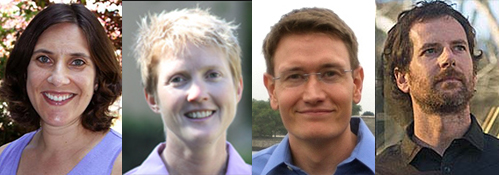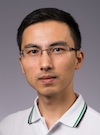
CSE represents one of the top programs worldwide in the area of computer science education research, according to the Computing Education Blog. Georgia Tech computer scientist Mark Guzdial, who writes the blog, noted that only two U.S. universities can boast of having established a 'critical mass' of researchers in computer educaton research. He defines critical mass as including at least three faculty members whose primary research is in the area. The two universities he points to? University of Nebraska at Omaha (UNO), and the University of California San Diego. UNO's group is only now becoming large enough to qualify, while UC San Diego began building its program more than a decade ago, and it currently includes (pictured below l-r) Christine Alvarado, Beth Simon, Leo Porter and Scott Klemmer.
 In 2004 CSE hired lecturer Beth Simon who received Ph.D. from CSE in 2002. Since then, the group has gradually expanded to include Alvarado (2012) and Porter (2014). Porter -- another CSE Ph.D. graduate -- arrived from Skidmore College to join teaching professors Alvarado and Simon in the department. The blogger noted that Porter has won many of the best-paper awards at the two most prestigious conferences in the field, SIGCSE and International Computing Education Research (ICER).. Alvarado joined after being "key to the growth of women in computing at Harvey Mudd," noted Guzdial. Beth Simon, who "still probably has the most ICER publications of anyone, has just returned to UCSD," following a leave of absence to work at Coursera, the largest platform for online learning. But the list doesn't end there. The blog notes that CSE Prof. Scott Klemmer (who has dual appointments in CSE and Cognitive Science) also touches on computer science educaton research; notably, he gave the keynote presentation at the ICER conference in 2013, where he talked about “Design at Large” and how his work on design can be applied to computer-science education. Klemmer is currrently a co-director of the Design Lab at UC San Diego.
In 2004 CSE hired lecturer Beth Simon who received Ph.D. from CSE in 2002. Since then, the group has gradually expanded to include Alvarado (2012) and Porter (2014). Porter -- another CSE Ph.D. graduate -- arrived from Skidmore College to join teaching professors Alvarado and Simon in the department. The blogger noted that Porter has won many of the best-paper awards at the two most prestigious conferences in the field, SIGCSE and International Computing Education Research (ICER).. Alvarado joined after being "key to the growth of women in computing at Harvey Mudd," noted Guzdial. Beth Simon, who "still probably has the most ICER publications of anyone, has just returned to UCSD," following a leave of absence to work at Coursera, the largest platform for online learning. But the list doesn't end there. The blog notes that CSE Prof. Scott Klemmer (who has dual appointments in CSE and Cognitive Science) also touches on computer science educaton research; notably, he gave the keynote presentation at the ICER conference in 2013, where he talked about “Design at Large” and how his work on design can be applied to computer-science education. Klemmer is currrently a co-director of the Design Lab at UC San Diego.
 Since 2014 CSE has had four faculty members all or partly focused in this area, and there is at least one new arrival in Cognitive Science this year: Philip Guo (at left) intends to work with Porter, Simon and Alvarado, and is expected to receive a partial appointment in CSE. He is coming from the University of Rochester, where he was an assistant professor of computer science. The blog notes that Guo "built the Python Tutor that we use in our ebooks, blogs frequently on CS Ed issues, and has been publishing a ton recently (including four papers at VL/HCC last year) on issues related to learning programming." .After finishing his Ph.D. at Stanford in Computer Science in 2012, Guo built online learning tools as a software engineer at Google, and did a postdoc at the online learning platform, edX, while in MIT's artificial-intelligence lab. So why join CogSci? "My recent research has been heading more and more toward using computers as tools to augment human cognition," writes Guo in his own blog, "rather than trying to improve the underlying computing technologies." He expects to collaborate with faculty who specialize in human-computer interaction in both departments, as well as with CSE faculty including Ranjit Jhala, Sorin Lerner and Bill Griswold in the area of programming languages and software engineering
Since 2014 CSE has had four faculty members all or partly focused in this area, and there is at least one new arrival in Cognitive Science this year: Philip Guo (at left) intends to work with Porter, Simon and Alvarado, and is expected to receive a partial appointment in CSE. He is coming from the University of Rochester, where he was an assistant professor of computer science. The blog notes that Guo "built the Python Tutor that we use in our ebooks, blogs frequently on CS Ed issues, and has been publishing a ton recently (including four papers at VL/HCC last year) on issues related to learning programming." .After finishing his Ph.D. at Stanford in Computer Science in 2012, Guo built online learning tools as a software engineer at Google, and did a postdoc at the online learning platform, edX, while in MIT's artificial-intelligence lab. So why join CogSci? "My recent research has been heading more and more toward using computers as tools to augment human cognition," writes Guo in his own blog, "rather than trying to improve the underlying computing technologies." He expects to collaborate with faculty who specialize in human-computer interaction in both departments, as well as with CSE faculty including Ranjit Jhala, Sorin Lerner and Bill Griswold in the area of programming languages and software engineering

